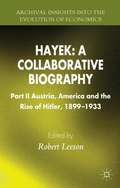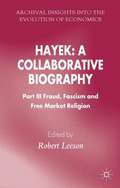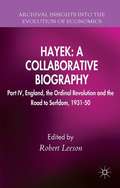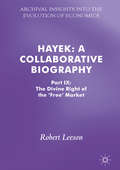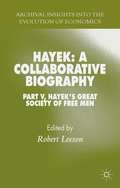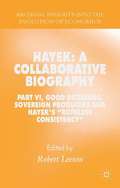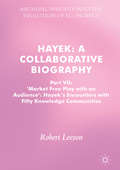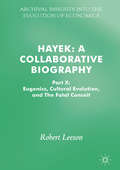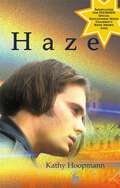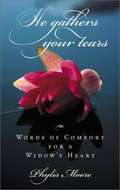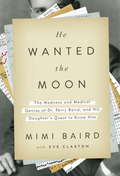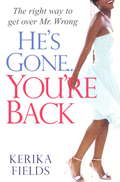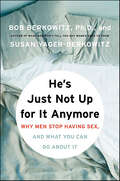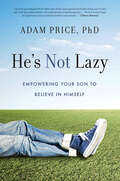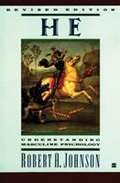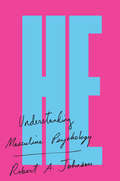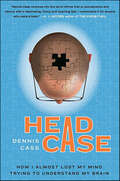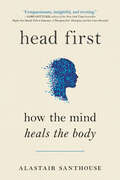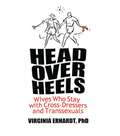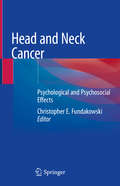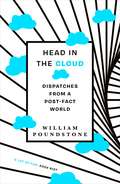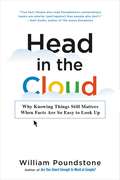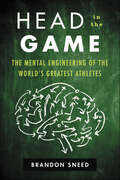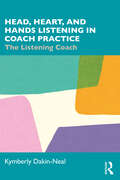- Table View
- List View
Hayek: Part II Austria, America and the Rise of Hitler, 1899- 1933 (Archival Insights Into the Evolution of Economics)
by Robert LeesonA group of leading scholars from around the world use archival material alongside Hayek's published work to bring a new perspective on the life and times of one the 20th Century's most influential economists. This much awaited second volume details the life of Hayek from 1899 to1933 covering Hayek's time in Austria and the USA.
Hayek: Part III Fraud, Fascism and Free Market Religion (Archival Insights Into the Evolution of Economics)
by Robert LeesonIn 1984, F. A. Hayek, the co-leader of the Austrian free market neo-classical school, embraced the transparently fraudulent assertion made by Donald McCormick, aka Richard Deacon, in The British Connection (1979) which accused A. C. Pigou, the co-leader of the Cambridge market failure neo-classical school, of being a Soviet spy. Over lunch at the Reform Club with 'Deacon' McCormick, the former Sunday Times Foreign Manager, Hayek authenticated the fraudulent signature contained in a 1905 diary the essence of the case against Pigou. In this third volume of Hayek: A Collaborative Biography, a distinguished collection of academics and specialists examine 'Deacon' McCormick's fraudulent career: summarizing the large volume of incriminating evidence that was available to Hayek in 1984. Hayek's 1931 unsubstantiated assertion about having predicted the Great Depression was obviously matched by other equally unreliable assertions. That Hayek's assertions have been uncritically repeated by his disciples illuminates dynamics of that school. Austrian School economists who promote financial sector deregulation and climate change denial appear to resemble a free market religion rather than the scientific communities examined in other volumes in this series. "
Hayek: Part IV, England, the Ordinal Revolution and the Road to Serfdom, 1931- 50 (Archival Insights Into the Evolution of Economics)
by Robert LeesonThe study encompasses historical, social, political and economic viewpoints in examining Hayek's life and the history of economic thought. In the early 1930s, Hayek's business cycle work was apparently defeated by John Maynard Keynes and Piero Sraffa. However, Hayek had three successes. The Ordinal revolution, which undermined the foundations of welfare economics, was successfully transplanted from pre-war Austria and Lausanne to inter-war Britain. The Road to Serfdom (1944) attributed blame for Hitler not on those who funded him (the business sector) but on those who opposed him (socialists). In 1947, Hayek also launched the highly influential Mont Pelerin Society. Hayek had to diplomatically navigate around the other branch of the Austrian School (as represented by Ludwig Mises) whilst maintaining support from members of the nascent Chicago School. As an atheist Hayek had to compromise: the Society would not be named after two Roman Catholic aristocrats (The Acton de Tocqueville Society), but what later became known as the 'religious right' was, nevertheless, accommodated.
Hayek: Part IX: The Divine Right of the 'Free' Market (Archival Insights into the Evolution of Economics)
by Robert LeesonIn 1984, F. A. Hayek, the co-leader of the Austrian free market neo-classical school, embraced the transparently fraudulent assertion made by Donald McCormick, aka Richard Deacon, in The British Connection (1979) which accused A. C. Pigou, the co-leader of the Cambridge market failure neo-classical school, of being a Soviet spy. Over lunch at the Reform Club with 'Deacon' McCormick, the former Sunday Times Foreign Manager, Hayek authenticated the fraudulent signature contained in a 1905 diary the essence of the case against Pigou. In this third volume of Hayek: A Collaborative Biography, a distinguished collection of academics and specialists examine 'Deacon' McCormick's fraudulent career: summarizing the large volume of incriminating evidence that was available to Hayek in 1984. Hayek's 1931 unsubstantiated assertion about having predicted the Great Depression was obviously matched by other equally unreliable assertions. That Hayek's assertions have been uncritically repeated by his disciples illuminates dynamics of that school. Austrian School economists who promote financial sector deregulation and climate change denial appear to resemble a free market religion rather than the scientific communities examined in other volumes in this series. "
Hayek: Part V, Hayek's Great Society of Free Men (Archival Insights Into the Evolution of Economics)
by Robert LeesonThis fifth biographical volume examines the hypothesis that Hayek's promotion of the Great Society of Free Men was consistent with his behavioural postulate: amoral self-interest. His Constitution of Liberty promoted those with inter-generational entitlements as the true defenders of 'civilisation' and 'property' - an Austrian School of Economics vision of society dominated by the wealthy. According to Hayek, labour unions were enemies of his 'spontaneous' order: yet unions evolved spontaneously. This archival series also provides an opportunity for reflection, correction and elaboration: two chapters responses to material contained in Part I of Hayek: A Collaborative Biography. <P><P>F.A. von Hayek (1899-1992), who's Nobel Prize for Economic Sciences appears to have been awarded, in part, for a job-interview assertion for which – after eight decades – no evidence has emerged, was famous for promoting the Austrian version of classical liberalism.
Hayek: Part VI, Good Dictators, Sovereign Producers and Hayek's "Ruthless Consistency" (Archival Insights Into The Evolution of Economics)
by Robert LeesonIn this sixth volume contributors examine Hayek's neoliberal economics and politics in the 20th century, and the demise of the socialist system. Taking a closer look at Hayek's time in Australia, and his time spent travelling in the east.
Hayek: Part VII, 'Market Free Play with an Audience': Hayek's Encounters with Fifty Knowledge Communities (Archival Insights into the Evolution of Economics)
by Robert LeesonThis book is the seventh volume in this series which explores the life of Nobel Price-winning economist F.A. Hayek (1899-1992). The volume uses archival material, juxtaposed with Hayek’s published work to challenge the existing perceptions of his life and thought. It examines the methods by which Hayek interacted with – and schemed against – the knowledge communities that he encountered during his very long life. Chapters explore the ‘rules of engagement’ that Hayek employed when interacting with fifth leading knowledge communities, including the Nobel Prize selection committee who were led to believe his claim about having predicted the Great Depression. It also explores his interactions with William Beveridge, the founder of the modern British Welfare State, A. C. Pigou, the founder of the market school, J. M. Keynes, Sir Arthur Lewis, and Abba Lerner.
Hayek: Part X: Eugenics, Cultural Evolution, and The Fatal Conceit (Archival Insights into the Evolution of Economics)
by Robert LeesonThis tenth part of Robert Leeson's collaborative biography of Friedrich August von Hayek explores Hayek’s thought on the free market and democracy. Using an unparalleled array of archival materials, Leeson reconstructs Hayek’s thinking as the notorious economist and his acolytes set about reshaping the post-war economic order. Darker areas of Hayek’s thought are also explored, including the influence of eugenics on his thought and his support for radical right-wing dictatorships in South America. <P><P> Leeson concludes this volume with a collection of chapters written by eminent scholars of Hayek. These chapters cover subjects as diverse as Hayek’s influence on scholars of Darwinian evolution, his views on psychology, and cultural evolution.
Haze
by Kathy HoopmannSeb is a loner. Brilliant with numbers but hopeless with people, he prefers the company of computers and his only friend, Guzzle. Things change for the better when he makes friends with Kristie, Madeline and Jen, and a new computer teacher - Miss Adonia - arrives. However, Seb is soon caught up in a web of computer fraud and lies and turns to Madeline's mysterious cyber friend for help. Weaving the facts of Asperger Syndrome into the story, this fast-paced book is acclaimed author Kathy Hoopmann's best novel yet and will be a riveting read for teenagers of all sorts and abilities.
He Gathers Your Tears Words of Comfort for a Widow's Heart
by Phylis MooreThis is an excellent book written through the grieving period of a widow. Phylis Moore intersperses daily journal reflections with Scripture to offer comfort for the hardship described.
He Wanted the Moon
by Eve Claxton Mimi BairdA mid-century doctor's raw, unvarnished account of his own descent into madness, and his daughter's attempt to piece his life back together and make sense of her own. Texas-born and Harvard-educated, Dr. Perry Baird was a rising medical star in the late 1920s and 1930s. Early in his career, ahead of his time, he grew fascinated with identifying the biochemical root of manic depression, just as he began to suffer from it himself. By the time the results of his groundbreaking experiments were published, Dr. Baird had been institutionalized multiple times, his medical license revoked, and his wife and daughters estranged. He later received a lobotomy and died from a consequent seizure, his research incomplete, his achievements unrecognized. Mimi Baird grew up never fully knowing this story, as her family went silent about the father who had been absent for most of her childhood. Decades later, a string of extraordinary coincidences led to the recovery of a manuscript which Dr. Baird had worked on throughout his brutal institutionalization, confinement, and escape. This remarkable document, reflecting periods of both manic exhilaration and clear-headed health, presents a startling portrait of a man who was a uniquely astute observer of his own condition, struggling with a disease for which there was no cure, racing against time to unlock the key to treatment before his illness became impossible to manage. Fifty years after being told her father would forever be "ill" and "away," Mimi Baird set off on a quest to piece together the memoir and the man. In time her fingers became stained with the lead of the pencil he had used to write his manuscript, as she devoted herself to understanding who he was, why he disappeared, and what legacy she had inherited. The result of his extraordinary record and her journey to bring his name to light is He Wanted the Moon, an unforgettable testament to the reaches of the mind and the redeeming power of a determined heart.
He's Gone...You're Back
by Kerika FieldsYour relationship may be over--but you've only just begun. . . It may have been a long time coming, but the moment in your relationship when you know it's over once and for all, has finally arrived. And while this signifies an ending, it also means a beautiful new beginning. In this supportive and inspiring book, Kerika Fields helps you navigate the dark, scary post-relationship abyss, and come out the other side ready to laugh--and love--again. With humor, understanding--and real-life stories from women just like you--Kerika shows you how to mourn the loss, and move on. Here is a mind, body, and spirit plan for recovery that will guide and reassure you through the worst days, and prepare you for the future--because the best really is yet to come. Discover how to: Commit to your recovery like you were committed to your relationship Avoid becoming another angry, bitter woman (there are enough of those!) Keep showing up to your life--no matter how disappointed or depressed you are Fight--and win--the toughest battle: between yourself and your demons Complete with a daily self-love checklist, affirmations, recommended reading, an uplifting You're Back! playlist to get you dancing through your tears, and much more. Whether you're stuck in the limbo of a painful relationship or struggling in solitude, this invaluable book will see you through to a life filled with abundance and joy.
He's Just Not Up for It Anymore: Why Men Stop Having Sex, and What You Can Do About It
by Susan Yager-Berkowitz Bob BerkowitzAn estimated twenty million American men and women are in relationships in which the man has stopped being sexually intimate. Is the problem physical, emotional, or psychological—or are these guys simply bored with their partners?To find answers, bestselling author and relationship expert Dr. Bob Berkowitz and his wife, Susan Yager-Berkowitz, began an unprecedented survey of more than four thousand men and women in this situation, gathering data and following up with hundreds of interviews with selected respondents. Why Men Stop Having Sex provides a unique window into the sexless man's mind—so that men and women can understand this important issue and begin to address the problems that have inhibited intimacy, and ultimately solve them.
He's Not Lazy: Empowering Your Son to Believe In Himself (He's Not Lazy)
by Adam Price&“Clinical psychologist Price offers one of the most significant books of the year in this new look at an old problem—the underperforming teenage boy… Price&’s book brings an important voice to a much needed conversation.&” —Library Journal (Starred review) On the surface, capable teenage boys may look lazy. But dig a little deeper, writes child psychologist Adam Price in He&’s Not Lazy, and you&’ll often find conflicted boys who want to do well in middle and high school but are afraid to fail, and so do not try. This book can help you become an ally with your son, as he discovers greater self-confidence and accepts responsibility for his future.Why are some teenage boys unmotivated? Why do they spend endless hours playing video games or glued to their phones and social media sites instead of studying? Is this a sign of laziness or something more troubling? As a clinical psychologist, Dr. Adam Price has found that teenage boys are extremely sensitive to the stress of our competitive achievement-oriented culture—one that has created a pressure cooker for today&’s adolescent. In He&’s Not Lazy, Dr. Price, a renowned expert on ADHD and learning disabilities, explains how to help a boy who is not lazy, but rather, is conflicted about trying his best. Dr. Price will guide you to discover hidden obstacles to your son&’s success, set expectations, and empower him to accept responsibility for his own future. He&’s Not Lazy will help you become your son&’s ally, as he discovers greater self-confidence and becomes more self-reliant. Rather than reacting to pressure by shunning academic responsibilities altogether or propping up fear-based rebellion with justifications like &“I am not going to be one of those nerds who have no life,&” or &“Tests don&’t measure intelligence or help you learn, so what&’s the point of studying for them?&” your teenage son can work with you using the guidance in this book.
He: Understanding Masculine Psychology
by Robert A. JohnsonWhat does it really mean to be a man? What are some of the landmarks along the road to mature masculinity? And what of the feminine components of a man's personality? <p><p> Women do not really know as much about men as they think they do. They have developed, over the centuries, considerable expertise in the technique of adapting to men, but that is not the same as truly understanding them. Women often labor under the delusion that life is really pretty easy for men, at least when compared to their own lot, and they have no idea what a complicated struggle is really involved in the transition from male childhood to real manhood. <p> As timely today as when it was first published, He provides a fascinating look into male identity and how female dynamics influence men.
He: Understanding Masculine Psychology
by Robert A. Johnson“Entertaining, informative, thought-provoking, mysterious, poetic. Men who read it will surely learn much about themselves, and women—particularly those who are unfortunately misled into thinking of men as “the enemy”—will find it a real eye-opener.”—Ruth Tiffany Barnhouse, M.D., Th.M., Harvard UniversityRobert A. Johnson's classic work exploring the differences between man and woman, female and male—newly reissued.What does it really mean to be a man? What are some of the landmarks along the road to mature masculinity? And what of the feminine components of a man's personality? Women do not really know as much about men as they think they do. They have developed, over the centuries, considerable expertise in the technique of adapting to men, but that is not the same as truly understanding them. Women often labor under the delusion that life is really pretty easy for men, at least when compared to their own lot, and they have no idea what a complicated struggle is really involved in the transition from male childhood to real manhood.As timely today as when it was first published, He provides a fascinating look into male identity and how female dynamics influence men.
Head Case: How I Almost Lost My Mind Trying to Understand My Brain
by Dennis Cass“Dennis Cass ventures into the terra infirma that is neuroscience, and returns with a fascinating, funny and touching tale. I recommend it for anyone who owns a brain.” -- AJ Jacobs, New York Times Bestselling author of The Know it AllIn the tradition of Supersize Me, Dennis Cass becomes a human guinea pig in a darkly comic journey to understand the human brain and find out what makes us who we areInfiltrating the world of neuroscience, Cass offers his own brain up to science, subjecting his mind and body to electric shocks, mind-numbing attention tests, stress tests of his own devising and cigarettes. In the spirit of George Plimpton and early Tom Wolfe, his exploits reveal the intricacies of fear, attention, stress, reward and consciousness from the inside out. Along the way, he weaves in the story of stepfather’s manic depression and drug addiction, as well as his own troubles with stress and depression, giving neuroscience a personal touch along with the clinical facts.Cass attacks the subject of the human brain with wit and candor, turning popular science into something distinctly human. Head Case is an imperative read for anyone who’s ever asked themselves why they are who they are.
Head Cases: Julia Kristeva on Philosophy and Art in Depressed Times (Columbia Themes in Philosophy, Social Criticism, and the Arts)
by Elaine MillerWhile philosophy and psychoanalysis privilege language and conceptual distinctions and mistrust the image, the philosopher and psychoanalyst Julia Kristeva recognizes the power of art and the imagination to unblock important sources of meaning. She also appreciates the process through which creative acts counteract and transform feelings of violence and depression. Reviewing Kristeva's corpus, Elaine P. Miller considers the intellectual's "aesthetic idea" and "thought specular" in their capacity to reshape depressive thought on both the individual and cultural level. She revisits Kristeva's reading of Walter Benjamin with reference to melancholic art and the imagination's allegorical structure; her analysis of Byzantine iconoclasm in relation to Freud's psychoanalytic theory of negation and Hegel's dialectical negativity; her understanding of Proust as an exemplary practitioner of sublimation; her rereading of Kant and Arendt in terms of art as an intentional lingering with foreignness; and her argument that forgiveness is both a philosophical and psychoanalytic method of transcending a "stuck" existence. Focusing on specific artworks that illustrate Kristeva's ideas, from ancient Greek tragedy to early photography, contemporary installation art, and film, Miller positions creative acts as a form of "spiritual inoculation" against the violence of our society and its discouragement of thought and reflection.
Head First: How The Mind Heals The Body
by Alastair SanthouseIn the tradition of Lori Gottlieb and Henry Marsh, a distinguished psychiatrist examines his own practice. Alastair Santhouse knew something was wrong the night he was on call during his medical training and got the news that a woman on the way to the ER had died in the ambulance. That meant he could go back to sleep! But he couldn't. He was overtaken with the sense that his joyful reaction was terrible failure. That night began his long journey away from the ER and into psychiatry. Head First chronicles Santhouse's many years treating patients and his exploration of the ways in which our minds exert a huge and underappreciated influence over our health. They shape our responses to symptoms that we develop, dictate the treatments we receive, and influence whether they work. They even influence whether we develop symptoms at all. Written with brutal honesty, deep compassion, and a wry sense of humor, Head First examines difficult cases that illuminate some of our most puzzling and controversial medical issues--from the tragedy of suicide, to the stigma surrounding obesity, to the mysteries of self-induced illness. Ultimately he finds that our medical model has failed us by promoting specialization and overlooking perhaps the single most important component of our health: our state of mind.
Head Over Heels: Wives Who Stay with Cross-Dressers and Transsexuals
by Virginia ErhardtCandid, first-hand accounts of couples who stay together despite highly emotional gender issues. Head Over Heels gives voice to thirty ordinary women who live extraordinary lives as partners to crossdressers, transgenderists, and male-to-female transsexuals. These unique women discuss, with honesty and great candor, how they first learned of their partners’ gender issues, how they’ve coped with the emotions that followed, how they’ve dealt with concerns about privacy/secrecy, and how they’ve handled disclosure to children, friends, and family members. Far from a collection of “happily ever after” stories, these narratives are filled with pain, courage, curiosity, and joy as each woman struggles to redefine a relationship that includes intimacy, social acceptance, dignity, and respect. The women whose stories are featured in Head Over Heels didn't know their partners were gender-variant when they first met. Some found out early on; others learned of their husbands' gender variance after decades of marriage. Some were told by their husbands—men they considered “regular guys;” others found out on their own, sometimes in shocking ways. Their stories represent a wide spectrum of women's life experiences with crossdressers, transgenderists, transsexuals who are nonoperative, pre-operative, and post-operative, families without children, families with children at home, and families with children who have left home. But these women share one thing in common: each has decided to stay in her relationship, exploring her new life with an open, yet cautious, heart. Some of the voices heard in Head Over Heels: “While putting my clothes on, I found a sales receipt on the bureau from K-Mart for shoes, a bra, and stockings. My immediate thought was that my husband had a girlfriend.” “He dressed for me one night and it was the worst experience of both our lives. I was shocked and he knew it and that hurt him.” “My siblings had been aware of Trish’s transsexualism for several years when she went full-time. They have told me that while I will always be welcome in their homes, Trish is not.” “My husband may think differently, but I do have a sexual identity. Actually, I’m real clear about it—I am a woman and he is a man. I do not allow him to crossdress in the bedroom. I married a man; therefore, I will sleep with a man.” Head Over Heels also includes historical and current information about resources and support for wives of gender-variant people, and a substantive introduction that includes basic information about sexual and gender identity and related issues.
Head and Neck Cancer: Psychological and Psychosocial Effects
by Christopher E. FundakowskiThis volume serves to help readers understand and address factors that contribute to the psychological distress and negative self-perception of patients with head and neck cancer to improve their quality of life. It explores many of these issues in depth, such as the trends in diagnosis of head and neck cancer, disfigurement, advances and outcomes associated with minimally invasive surgery, long-term quality of life and functional outcomes, issues related to cancer pain, importance and impact of nutrition, how reconstructive advances effect functional outcomes, the impact of cancer recurrence, and financial consequences of cancer diagnosis and treatment. Head and Neck Cancer: Psychological and Psychosocial Effects will help otolaryngologists, oncologists, surgeons, psychologists and healthcare professionals define the unique issues associated with the HNC patient population, discuss pertinent data, outline key aspects of high quality care in this population, and to draw attention to necessary future investigations and developments.
Head in the Cloud: Dispatches from a Post-Fact World
by William PoundstoneNever before have we had so much information at our fingertips. You might think that we are better-informed than ever, but there&’s one thing we can&’t ask Google: &‘What should I be googling?&’ The way we consume information in the digital age has been blamed for driving political polarisation and leaving us unable to agree on basic facts. It&’s also making us stupider. Personalised news feeds and social media echo chambers narrow our potential knowledge base. By now, we don&’t even know what we don&’t know. In Head in the Cloud, William Poundstone investigates the true worth of knowledge. An entertaining manifesto underpinned by big data analysis and illustrated by eye-opening anecdotes, it reveals the surprising benefits of broadening your horizons and provides an unnerving look at the consequences of being ill-informed.
Head in the Cloud: Why Knowing Things Still Matters When Facts Are So Easy to Look Up
by William PoundstoneThe real-world value of knowledge in the mobile-device age.More people know who Khloe Kardashian is than who Rene Descartes was. Most can't find Delaware on a map, correctly spell the word occurrence, or name the largest ocean on the planet. But how important is it to fill our heads with facts? A few keystrokes can summon almost any information in seconds. Why should we bother learning facts at all?Bestselling author William Poundstone confronts that timely question in HEAD IN THE CLOUD. He shows that many areas of knowledge correlate with the quality of our lives--wealth, health, and happiness--and even with politics and behavior. Combining Big Data survey techniques with eye-opening anecdotes, Poundstone examines what Americans know (and don't know) on topics ranging from quantum physics to pop culture. HEAD IN THE CLOUD asks why we're okay with spelling errors on menus but not on resumes; why Fox News viewers don't know which party controls Congress; why people who know "trivia" make more money than those who don't; how individuals can navigate clickbait and media spin to stay informed about what really matters. Hilarious, humbling, and wildly entertaining, HEAD IN THE CLOUD is a must-read for anyone who doesn't know everything.
Head in the Game: The Mental Engineering of the World's Greatest Athletes
by Brandon SneedAn intriguing blend of science and sports that explores how some of the worlds greatest athletes are utilizing the last frontier of performance-enhancing technology—the mental mapping and engineering of their own brains—for peak performance, and what it means for the future of athleticism, sports, and the rest of us.Moneyball showed how statistics were revolutionizing baseball. The Sports Gene revealed the role genetics play in sports. Now, Head in the Game examines the next evolution: how mental engineering—the manipulation of the cognitive processes of the brain—can make gifted athletes even better. For years, technology—from EEG (electroencephalogram) to fMRI (Functional magnetic resonance imaging) to video games, tablets, and personal data collection devices—have been used with soldiers to understand their physical and mental functioning. Touching on brain functionality vital to sports—both the "hard" (coordination, stimuli processing, functional memory, decision-making, load-processing) and the "soft" (emotion regulation, visualization, psychology, mindfulness)—this tech is now being adopted by scores of championship franchises and top athletes—including scrappy underdogs forced to innovate and elite players looking for an advantage. Star NFL quarterbacks Russell Wilson and Tom Brady, the NBA’s Kyle Korver, and Olympic volleyball champion Kerri Walsh are using mental engineering to up their game. It’s not luck that has transformed the San Antonio Spurs into a formidable force—it’s science, Sneed demonstrates. As mental engineering becomes widespread—taking athletes who are already freaks of nature and making them better—the impact on the multi-billion dollar sports industry will be dramatic on players, managers, trainers, owners, and even fans. Interviewing athletes and coaches, visiting training camps and sports science firms, Brandon Sneed offers a firsthand, on-the-ground look at this exciting breakthrough that has the potential to transform to transform the game—and all our lives.
Head, Heart, and Hands Listening in Coach Practice: The Listening Coach
by Kymberly Dakin-NealThis book is an exploration of intentional listening as an essential skill for coaches. It introduces the Head, Heart, and Hands Listening model as a vital tool to amplify effective listening in coaching practice. Accessible and applicable, the book explores the three listening modalities of Head, Heart, and Hands as active, though largely unconscious, lenses that inform the potency of our listening. Dakin-Neal argues that once coaches identify "how" they listen, they can assist their clients in more targeted ways to positively impact their personal and professional lives. Chapters are divided into the three listening modalities, Head, Heart, and Hands, and are filled with case studies, stories, reflective questions, and exercises from the author’s experience to help coaches strengthen their listening skills. The book also includes a comprehensive listening assessment for coaches to use in practice. This book is essential reading for coaches in practice and in training as well as organizational psychologists, HR professionals, and those working within corporations.
